- Sustainability TOP
- Social
- Human Rights
Basic Approach
In February 2022, the Board of Directors approved and established the Isuzu Group Human Rights Policy (hereinafter referred to as the Policy).
In December 2023, the Policy was revised based on the new corporate philosophy, ISUZU ID, announced in May of the same year.
The policy complies with the United Nations Guiding Principles on Business and Human Rights and reiterates Isuzu's commitment to contribute to the realization of a sustainable society by promoting business activities that respect human rights as part of its corporate social responsibility amid expectations that the international community will foster a corporate culture of respect for human rights and make efforts across all business activities.
In accordance with the policy, Isuzu will comply with international norms, laws and regulations, group norms, etc., develop a Group human rights promotion system, engage in human rights due diligence, and provide appropriate education to officers and employees. Additionally, based on the importance of respect for human rights in business, we will engage in dialogue with our stakeholders and strive to promote understanding among our business partners.
The policy is currently available in nine languages to ensure greater understanding among a broader range of stakeholders. For details, please refer to Isuzu Group Human Rights Policy.
Management Structure
Amid expectations that the Company foster a corporate culture of respect for human rights in all aspects of its business activities, the Isuzu Group is promoting business activities that respect human rights as part of its corporate social responsibility. Human rights issues are deliberated upon by the Sustainability Committee, which is chaired by the director and composed of the officers in charge of each division. Important matters are then reported to the Management Meeting and the Board of Directors. The Sustainability Department, a dedicated department, is mainly responsible for the implementation of human rights safeguarding measures together with related divisions. Under the Sustainability Committee, the Social Promotion Subcommittee, a working group that addresses social issues, brings together representatives from all divisions to discuss human rights issues.
Additionally, at the Isuzu Group Sustainability Liaison Conference, we not only share information with sustainability managers of Group companies, but also appoint human rights officers in each company to coordinate progress at the Group Human Rights Promotion Officers Meeting. In this manner, the Group as a whole is united in its efforts to promote initiatives to respect human rights.
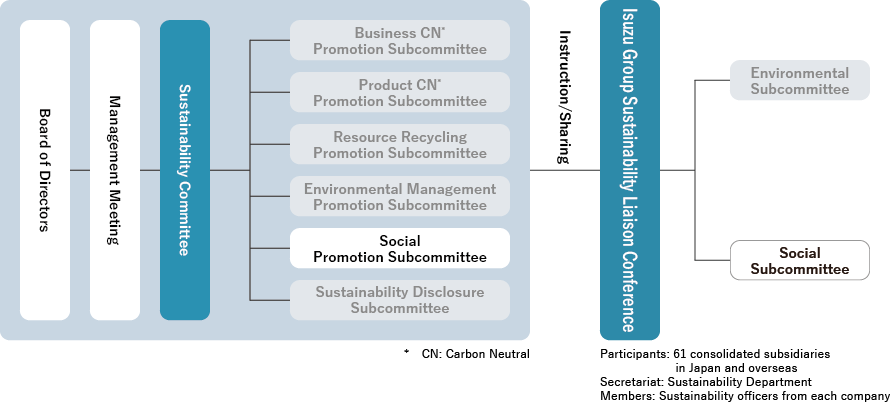
Number of Reports and Deliberations on Human Rights Issues at Each Meeting Body
| FY | Sustainability Committee | Social Promotion Subcommittee | Isuzu Group Sustainability Liaison Conference | Group Human Rights Promotion Officers Meeting | ||
|---|---|---|---|---|---|---|
| Reports | Deliberations | Discussions | Reports | Reports | Reports | |
| 2023 | 4 | 0 | 0 | 1 | 1 | 0 |
| 2024 | 5 | 3 | 0 | 4 | 1 | 3 |
| 2025 | 4 | 0 | 1 | 2 | 2 | 1 |
Education and Awareness for Respecting Human Rights
For employees: To recognize the importance of respect for human rights in corporate activities, we conduct basic human rights education for all employees of our Group companies in Japan and overseas. Additionally, to ensure that new and mid-career employees have an awareness of respect for human rights in corporate activities, we have added basic knowledge of respect for human rights to our induction training programs. Also, to promote human rights due diligence, we regularly provide practical training for human rights promotion officers at our Group companies.
For executives: In fiscal 2024, we invited external experts to give a presentation on business and human rights to members of the Sustainability Committee. This session included a dialogue between executives and external experts.
For business partners: To promote human rights-respecting business practices throughout the supply chain, Isuzu has been holding annual human rights seminars for business partners since fiscal 2022. In fiscal 2025, we held a seminar on the theme of Well-Being Management.
Initiatives
The Isuzu Group, under the Isuzu Group Human Rights Policy, is advancing the development of human rights due diligence processes by referring to guidelines such as the OECD Due Diligence Guidance for Responsible Business Conduct and the Japanese Government's Guidelines for Respecting Human Rights in Responsible Supply Chains. We are committed to the practice of respecting human rights.
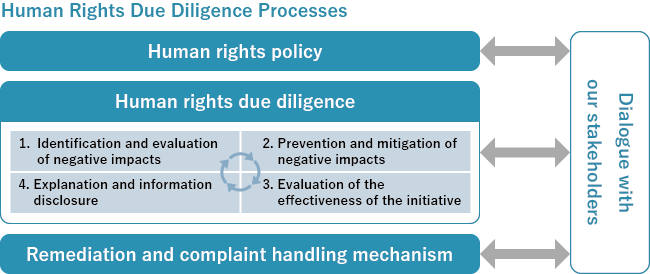
Human Rights Due Diligence Processes
In February 2024, Isuzu reviewed and quantitatively assessed human rights risks within its Group and its supply chain at the Group level to identify notable human rights issues. From these issues, we selected priority themes to be addressed in the short to medium term, and developed prevention and mitigation measures focused on these priority themes.
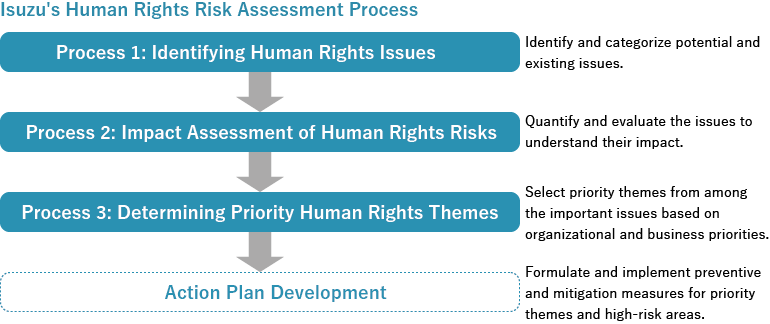
Human Rights Due Diligence Medium- to Long-Term Plan
FY2023–2024: Establishment of a human rights due diligence framework at Isuzu
FY2025–2027: Development of a PDCA cycle at the Group level
FY2028–2030: Implementation and evolution of the PDCA cycle
Initiatives for Priority Themes
Priority Theme 1: Issues of Foreign Workers within the Group, Including Sales Companies and the Broad Supply Chain
Approach and Direction of Initiatives
Currently, many technical intern trainees and other foreign workers are employed in the Japanese automobile industry. We have confirmed that foreign technical intern trainees are widely accepted by the Isuzu Group and its business partners. In light of this situation, we have recognized issues related to foreign workers as one of the important human rights themes in Isuzu's supply chain and are taking various measures to address them.
We will continue to expand the scope of our initiatives, focusing on labor environment-improvement programs, including interviews with foreign workers, and giving priority to subsidiaries and business partners that are considered to have high business and country-specific risks.
Results for Fiscal 2025
In fiscal 2025, we conducted a survey on the enrollment of foreign workers at our Group companies and suppliers in Japan and Thailand. We also conducted a survey of the actual working conditions of foreign workers and introduced a consultation and relief service, with an emphasis on sales companies in Japan.
On-Site Survey of Foreign Workers
Isuzu has been conducting interviews with overseas technical intern trainees since fiscal 2023, to ensure objectivity and impartiality. In fiscal 2025, this initiative was developed into an on-site survey program with the addition of document verification as well as living and working environment verification according to international standards and Isuzu standards. The interviews were conducted in person with the assistance of the Global Alliance for Sustainable Supply Chains (ASSC). As a result, some issues were identified in areas such as occupational safety, but all were confirmed to be well managed with a high level of transparency in employment management. In the future, we will continue to expand and sustain our human rights activities with the cooperation of our Group companies and business partners, and we will respond sincerely to improvement suggestions and other feedback.
On-Site Survey Records
| Date | Company | Nationality / Number of Participants |
|---|---|---|
| January 2023 | Company A (Group Company) | Indonesia / 3 people |
| February 2023 | Company B (Business Partner) | China / 4 people |
| February 2023 | Company C (Business Partner) | Indonesia / 3 people Thailand / 1 person |
| December 2023 | Company D (Group Company) | Cambodia / 10 people |
| December 2023 | Company E (Business Partner) | Indonesia / 2 people |
| December 2023 | Company F (Business Partner) | Vietnam / 3 people |
| January 2025 | Company G (Group Company) | Philippines / 2 people |
| January 2025 | Company H (Business Partner) | Indonesia / 6 people |
Examples of Improvements Tracked After On-Site Survey
Company A (Group company): Following the feedback that documents related to workers' rights, such as safety and health signage, disaster response rules, payslips, and employment contracts, should ideally be provided in the local language, it was confirmed that quality-related documents were translated into Indonesian and released. Additionally, it was verified that all technical intern trainees were registered in the safety confirmation system, enhancing preparedness for emergencies.
Company C (Business partner): Concerning the issue that some company-provided housing for foreign workers lacked locked safes, it was confirmed that, one year later, all workers had been provided with locked safes.
Implementation of Unique Program (Plant Tour)
Additionally, as part of our unique program, we held a plant tour in October 2023 for overseas technical intern trainees from our business partners, inviting them to our Fujisawa plant. The goal of this initiative was to deepen their understanding of how the parts they manufactured were ultimately incorporated into the final products and to enhance their motivation for their work. Participants shared feedback such as, "Seeing our products installed in the display vehicles at Isuzu Plaza made me feel a closer connection to Isuzu than ever before," and "The plant tour allowed me to reappreciate the importance of maintaining and improving quality and ensuring stable supply, and I would like to apply the insights gained from the tour within our own company."
Recruitment of Foreign Workers in Accordance with Ethical Practices
Isuzu has been recruiting overseas technical intern trainees for many years. Initially, the aim was to enhance and strengthen technical skills within our overseas Group companies. However, by widely sharing manufacturing know-how, we believe we can achieve international contribution through human resource development more effectively. In recent years, we have increasingly accepted many overseas technical intern trainees through Group management schemes.
We are committed to creating an environment where interns can focus on their training by implementing unique measures throughout the entire process, from recruitment and entry preparation, including financial support during the entry preparation phase, to job support after their return.
Example of Initiatives: Support System for Foreign Engineers at Sales Companies
Our sales companies are working on smooth acceptance of foreign engineers and human resource development. In fiscal 2025, representatives from major sales companies gathered approximately once every two months to exchange opinions on how to manage the education and retention of foreign engineers at their companies. In addition, we have conducted "cross-cultural understanding e-learning" video training to help Japanese and non-Japanese employees understand each other's culture and communication characteristics and thereby create a workplace where everyone can thrive.
Priority Theme 2: Management of Human Rights Issues and Initiatives in the Value Chain, Including Logistics and Downstream Value Chain
Approach and Direction of Initiatives
Isuzu aims to engage in socially responsible procurement activities together with our business partners in order to meet the expectations of all stakeholders.
In 2014, we established the “ISUZU Supplier CSR Guideline” with the aim of sharing values related to sustainability—including the environment and human rights—across the entire supply chain.
In October 2025, we conducted a comprehensive revision of the guidelines to expand their scope beyond procurement activities to encompass all business activities and the entire value chain, and renamed them the “Isuzu Group Supplier Sustainability Guidelines” (hereinafter referred to as “the Guidelines”).
Through these Guidelines, we request not only that our business partners promote their own initiatives, but also that they disseminate the Guidelines within their supply chains and understand actual conditions. In addition, we ask major business partners to submit a Self-Assessment Questionnaire (SAQ), and when risks are identified, we conduct on-site or remote interviews and request efforts toward improvement.
Approach to Surveying the Status of Sustainability Initiatives
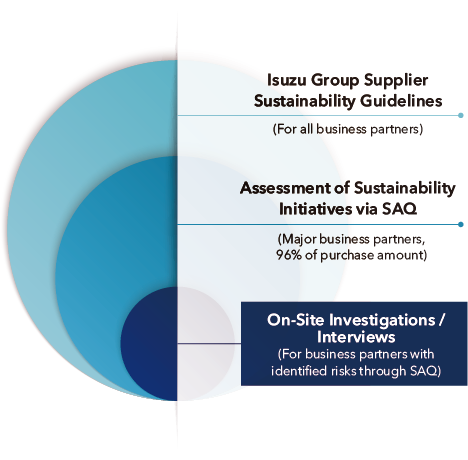
Results for Fiscal 2025
In fiscal 2025, Isuzu strengthened its follow-up activities to improve the rate of signature collection for the Guidelines and the SAQ response rate in Isuzu's supplier network, and further expanded the scope of the activities. As of May 2025, we have received signatures from business partners representing approximately 99% of our annual purchasing value, and we have received SAQ responses from 375 of our major business partners (representing approximately 99% of our annual domestic purchasing value). The SAQs revealed that there are sustainability risks at 10 business partners. For those business partners whose risks have been identified, we conduct on-site or remote interviews and ask them to work on improvements.
For our Group companies, we have disseminated the approach to sustainability-related surveys and started SAQs and on-site surveys from major overseas sites.
Responsible Mineral and Raw Material Sourcing
Isuzu considers the use of conflict minerals to be a serious problem in the supply chain as these minerals cause human rights infringements, environmental destruction, and illegal mining in conflict zones, and are used to finance militant forces. This idea is stated in the Isuzu Group Responsible Mineral Sourcing Policy. For the procurement of high-risk raw materials, we request our business partners to confirm the status within the supply chain in the Isuzu Group Supplier Sustainability Guidelines.
Initiatives for Key Labor Issues Outside of Priority Themes
Risk Assessment for Labor Issues
Isuzu identifies risks in areas of occupational health and safety, discrimination, harassment, mental health, and management failures caused by differences in values. These risks are evaluated quarterly to determine whether they have arisen, and if so, to assess countermeasures to prevent them and minimize their impact.
Prevention of Child Labor and Forced Labor
At Isuzu, the employment of children is strictly prohibited by the employment rules, and there were no instances of hiring individuals under the age of 18 in fiscal 2024.
Employees directly employed by Isuzu are not compelled or restricted in their employment except as specifically agreed upon in accordance with employment rules and with the consent of the Isuzu Motors Labor Unions, organized by a majority of the employees. Furthermore, they will not be subject to discriminatory treatment based on nationality, creed, or social status in relation to the working conditions stipulated in the employment rules.
In the supply chain as well, Isuzu prohibits child labor and forced labor in accordance with the Isuzu Group Supplier Sustainability Guidelines.
Occupational Health and Safety
Based on Isuzu's health and safety philosophy, we promote business activities with employee safety and health as their foundation. The values are universal and remain unchanged at any time and in any environment. Isuzu promotes health and safety initiatives not only for its own employees, but also for those of affiliated companies and business partners working on its premises, regardless of their employment status.
Living Wage Support
Isuzu discusses wage levels and allocations at annual labor-management negotiations with the Isuzu Motors Labor Association, the labor union of the majority of our employees, and makes revisions as necessary. Additionally, we have established certain compensation standards for bonuses and other benefits during leaves of absence to help safeguard employees' livelihoods.
Isuzu and the Labor Association have concluded an agreement on Isuzu's own age-based minimum wages in addition to the Company's internal minimum wage agreement, to provide a safety net for the living standards of the employees.
The above agreements have given a ripple effect on specific minimum wages (minimum wages set for each specific industry). Furthermore, these agreements are reported by the Isuzu Motors Labor Union to the National Federation of Isuzu Motors Workers' Unions, the highest-level union, to encourage an increase in the minimum wages across the entire Group.
Prohibitions Against Discrimination
Black Economic Empowerment Policy Initiatives at Isuzu Motors South Africa
The Isuzu Group is based on employing local workers and actively recruits locally in the countries and regions in which it operates.
Isuzu Motors South Africa (IMSAf), which produces and sells commercial vehicles, buses, and LCVs for South Africa and neighboring countries, does not only promote employment in the region but is also actively working to support South Africa's Broad-Based Black Economic Empowerment (B-BBEE) policy.
In fiscal 2025, the percentage of management considered as HDSA* was 41.5%, while the percentage of employees was 84.8%.
Additionally, IMSAf has achieved Level 1 certification on the B-BBEE scorecard for four consecutive years, establishing its position as an industry leader.
- *Historically Disadvantaged South Africans: South Africans who have been historically disadvantaged due to discrimination against Black people, women, etc. during the apartheid era.
Respect for Women's Rights
Isuzu holds various events in Japan and overseas on International Women's Day to promote women's empowerment and respect for their rights. In fiscal 2025, Isuzu East Africa held an event to recognize 11 female employees who embody the Accelerating Action philosophy. Under the same theme, at Isuzu Motors India, female employees conducted a convoy ride with Isuzu vehicles. Isuzu Motors International also provided an opportunity for management and female employees to gather together to share experiences and demonstrate leadership, reaffirming the importance of creating a comfortable work environment. Isuzu will continue to further promote women's empowerment through these multifaceted initiatives.
In addition, a seminar on experiencing menstrual pain was held for managers in Isuzu's Manufacturing Division. This seminar is designed to increase managers' knowledge and understanding of menstrual pain, to promote empathy for the difficulties faced by female employees, and to enable managers to provide appropriate support. In this way, practical advice and concrete measures were also shared, with the aim of realizing a workplace environment where female employees can comfortably work.
Relief and Dialogue
Relief and Complaint Handling Mechanism
Isuzu has established internal or third-party consultation services for employees, business partners, and workers in the supply chain. In response to consultations on human rights violations, we are committed to providing fair and equal relief to those who seek consultation in accordance with the United Nations Guiding Principles on Business and Human Rights.
Establishment of an Employee Consultation Service
Isuzu has established three consultation counters for internal reporting and consultation on compliance issues, including comprehensive corruption practices such as discrimination, harassment, hospitality, gift-giving, and insider trading. These counters are: (1) a workplace counter (supervised by the immediate supervisor), (2) an intra-division counter (supervised by the division manager), and (3) a company-wide counter (supervised by the Enterprise Risk Management Department). As impartial receivers of information, these contact points are used for consultation not only in cases of clear violations of laws, regulations, or internal rules, but also concerning matters that appear suspicious. Additionally, they field inquiries regarding internal rules, laws, and regulations related to business operations. In addition to handling compliance-related matters, these counters also serve as points of contact for human rights-related inquiries and reports.
A suggestion box (External Point of Contact) has also been set up at an external law firm.
The internal and external consultation offices accept consultations and inquiries by e-mail, fax, telephone, and letter. In accordance with the Whistleblower Protection Act, the names of individuals who provide information and the content of such information are treated as confidential information and are protected to ensure that individuals will not be treated unfairly within the Company.
Business Partner Consultation Service
As a neutral consultation point for our business partners, we have established the Business Partner Consultation Service within the Enterprise Risk Management Dept. This service handles consultations from business partners on compliance and human rights matters. Additionally, personal information about informants and consultation details are treated as confidential in accordance with the Whistleblower Protection Act.
Establishment of Consultation Service for Foreign Workers in the Supply Chain
In October 2022, Isuzu participated in the consultation and remedy desk project of the Japan Platform for Migrant Workers towards Responsible and Inclusive Society (JP-MIRAI) as a way to build a relief mechanism for foreign workers. JP-MIRAI is a platform aimed at contributing to the creation of a prosperous and sustainable society by responsibly and stably accepting foreign workers and improving their working and living conditions, with the vision of becoming "a country of choice and trusted by migrant workers around the world" by the target year of 2030, in line with the SDGs. This project uses the JP-MIRAI web portal to disseminate necessary information to foreign workers, provide anonymous and multilingual external consultation services, and provide feedback to participating companies. Foreign workers at eight companies, including Isuzu, Isuzu Group companies, and business partners are currently participating in the project.
Dialogue with Stakeholders
Isuzu believes that it is important to proactively convey our thoughts to various stakeholders and actively listen to their voices. We recognize the importance of respecting human rights when conducting business, and we will continue to engage in dialogue with stakeholders while seeking the assistance of external experts on human rights. Through these efforts, we aim to make progress in addressing human rights issues.
Results for Fiscal 2025
Local Study Tour in Thailand for Japanese Companies
In September 2024, Isuzu participated in a local study tour in Thailand for Japanese companies held in conjunction with the United Nations Forum on Responsible Business and Human Rights in the Asia-Pacific Region 2024. The tour aims to deepen understanding of issues related to supply chain management, including migrant worker issues in Thailand. This event provided a rare opportunity to engage in direct dialogue with a variety of local stakeholders, including civil society organizations, labor unions, and workers.
Participation in Stakeholder Engagement Program Organized by the Caux Round Table Japan (CRT)
Isuzu has participated in the Stakeholder Engagement Program organized by CRT every year continuously since 2023 to acquire the latest knowledge required to implement human rights due diligence.
Past Results
Third-Party Review of Human Rights Activities
In February 2025, a review of Isuzu's human rights due diligence activities was conducted by Associate Professor Sakurai of Hosei University. Isuzu believes that third-party reviews from outside human rights experts play an important role in human rights due diligence activities. The reviews help ensure the objectivity of Isuzu's human rights respect activities and enhance social credibility and transparency. In addition, by receiving expert advice on how to comply with new laws, regulations, and international standards, we can manage human rights risks and improve our activities in response to changes in society. Isuzu will continue to hold regular dialogues with external human rights experts to continuously improve the effectiveness of its activities.
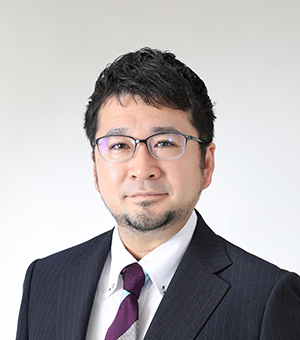
Associate Professor, Faculty of Sustainability Studies, Hosei University
The Isuzu Group shares information and promotes measures within the Group through two meeting bodies: the Group Sustainability Liaison Conference and the Group Human Rights Promotion Officers Meeting. I am very impressed by the Group's concerted efforts to respect human rights. The Group has also identified two priority themes: (1) Issues of Foreign Workers within the Supply Chain, and (2) Management of Human Rights Issues and Initiatives in the Value Chain. For both priority themes, I think it is wonderful that the Group conducts on-site activities such as interviews with foreign technical intern trainees and interviews with suppliers.
One of the challenges for the Group in the future is to deepen its approach to human rights issues. Since the priority themes have not been elaborated to the level of “what kinds of human rights issues are to be addressed,” the disclosed measures give an impression of being somewhat broad and shallow. While the approach taken to various issues is commendable, I believe that the Group should focus on the most serious human rights issues in the value chain and promote measures in a well-defined manner, based on the purpose of human rights due diligence.
Another important initiative is to ensure access to relief in human rights issues. I expect the Isuzu Group to formulate and implement a medium- to long-term action plan for the establishment of complaint-handling contact points open to the entire value chain.

